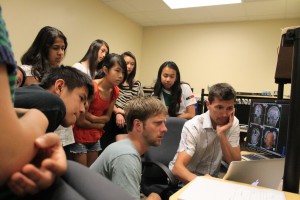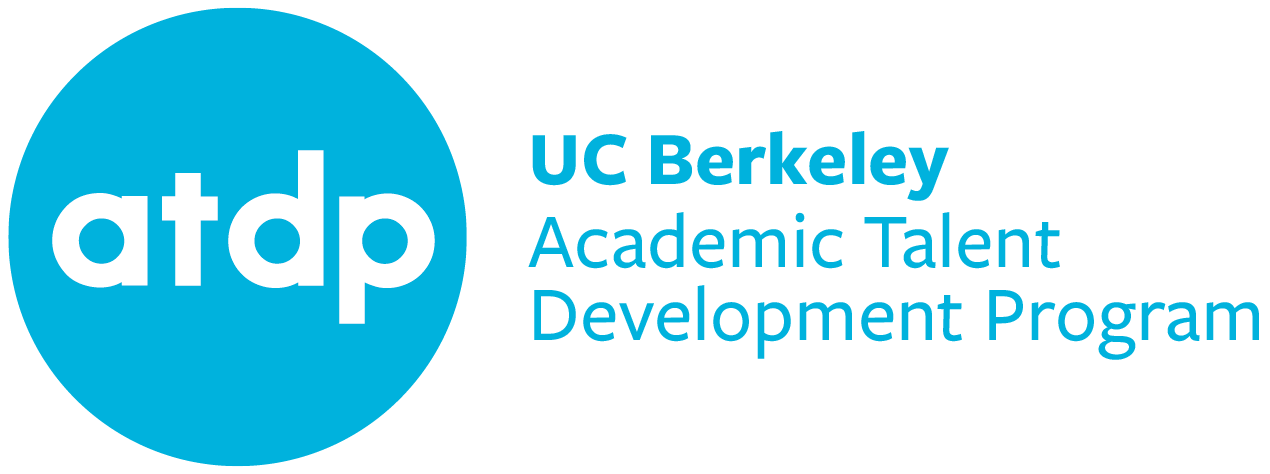Inside this issue…
Features
- This Week at ATDP: The Writing Process students meet trees, Environmental Science create ecosystems, and Cognitive Neuroscience students visit the Brain Imaging Center
- The ATDP Challenge
Class Photos
- SD3200.4 The Writing Process
- SD3278 Environmental Science
- SD3281 Cognitive Neuroscience
- S1202 Campus Tour (Exploration)
- S1210 Lunchtime Juggling (Exploration)
- S1212 Cartooning (Exploration)
- S1218 Robotics (Exploration)
SD instructors, submit your own class photos or request an ATDP staff photographer!
ATDP & Campus Resources
- Meet Your Counselors!
- Tutoring for ATDP Classes
- Explorations Schedules and Locations
- UC Berkeley Libraries
- Guest Wi-Fi Access
- Parking & Transportation
Previous S’12 Issues
From the Faculty Director
Welcome to Week 3 of ATDP 2012. You are almost at midterm, and many of your teachers are giving mid-term examinations to ascertain how well you have mastered the content so far. At the end of this week, students in 5-unit classes will have covered 45 days of school and those of your in 10-unit or year-long classes will have completed your first semester. Last week I mentioned several variables that are important for learning, including guided and deliberate practice, motivation, task commitment, and metacognition, and I indicated that I was going to spend some time on metacognition this week.
Cognition can be described as the process of acquiring knowledge and understanding; metacognition can de defined as “knowing about knowing.” In other words, metacognition refers to your ability to understand how you acquire knowledge and understanding. In 2010, a former ATDP student and teacher, Dr. Adena Young, completed her doctoral dissertation on metacognition in mathematics, and I am drawing on ideas from her dissertation for this column.
Although we speak of metacognition as if it were a single thing, metacognition can divided into four parts: metacognitive knowledge, metacognitive beliefs, metacognitive awareness, and metacognitive regulation. The last one is the aspect that I am going to focus on here. Metacognitive regulation, itself, can be divided into three broad phases—Preparation, Performance, and Evaluation.
Preparation
Preparation is what you should do first when you are in any learning or a problem-solving situation and begins with a task analysis. What is being asked of me in this problem or learning situation? Do I have to solve an equation for an unknown? Will I be using technical writing or creative writing? How familiar am I with and confident about what is being asked of me? Do I understand the requirements of the task? Are there multiple steps required to get to an answer? You may realize that you need to do some reading or exploration to analyze the task well.
Once you have completed your task analysis, you can turn to planning. Planning requires you to make concrete the steps you will be taking in addressing the problem. It involves choosing the strategies that you will be using for each goal and subgoal that you have. After laying out your plan of attack, you need to activate your knowledge base. Activating one’s knowledge base can involve remembering an equation or reviewing information in a book or on a website, but all of the knowledge activation strategies are geared toward having the right information available to you (and your brain) as you start to work on the problem.
Performance
 Once you have finished with Preparation, you are ready to enter the Performance phase, the actual doing of the task: writing a paper or computer program, completing mathematics problems, or completing a science project. As you are actively in the Performance phase, you need to be monitoring your and controlling your actions. This may sound easy, but consider all the times that you have received an assignment back and you have lost points because you did not follow the directions well, or you left out something obvious. How much effort does this task require? Can I do it while chatting with my friends or watching TV, or do I need to focus my attention more so I need to get rid of distractions while I work on this part? Am I using the right strategy here and will I come up with the same solution if I used a different strategy? Does what I write make sense, given what I have written before? Is my logic clear to someone who does not know this topic well? Monitoring and control should be used throughout the Performance phase.
Once you have finished with Preparation, you are ready to enter the Performance phase, the actual doing of the task: writing a paper or computer program, completing mathematics problems, or completing a science project. As you are actively in the Performance phase, you need to be monitoring your and controlling your actions. This may sound easy, but consider all the times that you have received an assignment back and you have lost points because you did not follow the directions well, or you left out something obvious. How much effort does this task require? Can I do it while chatting with my friends or watching TV, or do I need to focus my attention more so I need to get rid of distractions while I work on this part? Am I using the right strategy here and will I come up with the same solution if I used a different strategy? Does what I write make sense, given what I have written before? Is my logic clear to someone who does not know this topic well? Monitoring and control should be used throughout the Performance phase.
Evaluation
The final phase of metacognitive regulation is Evaluation. Interestingly, this is the phase that has the potential for the greatest benefits, but is also the phase which is used least. It is in the evaluation phase that you assess your product or solution. Did you miss a step? Did you make a small error in calculation which has resulted in an incorrect solution? In many cases, the lack of an Evaluation phase is related to a failure in Preparation, in that you thought that the task would take three hours and it took six; thus, you have no time to evaluate. Thus, you need to work on your preparation and evaluate it so that you do not make the same mistakes over and over again.

But how can you make the idea of metacognition concrete? You should practice using it. Take one of your assignments, and engage in Preparation, Performance, and Evaluation, and see how it works. Take a completed assignment that you did not do as well as you could have done and ask yourself if your lower score was a failure in Preparation, Performance, Planning, or a combination of these.
You can also check out the usefulness of metacognition by checking out a poster that Dr. Young presented on her research (click here). In this poster, she shows how a lack of metacognition can affect students’ performance negatively, even students who have very good grades. And if you have any metacognitive AHAs in the program, feel free to share them with me by email (frankc@berkeley.edu). Best metacognitive wishes for your midterms.
![]()
Faculty Director
